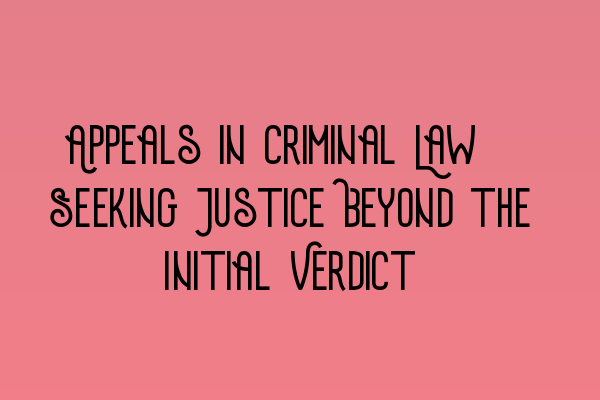Appeals in Criminal Law: Seeking Justice Beyond the Initial Verdict
When a person is convicted of a crime, it can be devastating for both the individual and their loved ones. However, the legal system recognizes that mistakes can happen, and individuals have the right to challenge the initial verdict through the appellate process. Appeals in criminal law provide a crucial avenue for seeking justice and rectifying any errors made during the trial.
The Importance of Appeals
An appeal provides an opportunity for a higher court to review the lower court’s decision and consider whether any legal errors were made. It safeguards the principles of fairness and ensures that justice is served. Through the appeals process, individuals can present new evidence, challenge the legitimacy of the initial trial, or argue that the law was misapplied.
However, it’s important to note that the appeals process is not a retrial. Instead, it focuses on examining legal issues and determining whether the decision reached in the lower court was reasonable based on the evidence and the law.
Grounds for Appeal
There are several grounds on which a criminal conviction can be appealed. These include:
- Errors in law: If the judge made errors in interpreting or applying the law during the trial, it may warrant an appeal.
- Errors in procedure: If there were procedural irregularities during the trial, such as improperly admitted evidence or a biased jury, an appeal may be appropriate.
- New evidence: If significant new evidence emerges that was not available during the trial, it may provide grounds for an appeal.
- Inadequate legal representation: If it can be demonstrated that the defendant’s legal representation was ineffective and negatively impacted the outcome of the trial, it may support an appeal.
It’s essential to consult with a qualified criminal law solicitor who specializes in appeals to assess the viability of your case. They can review the trial transcripts, gather relevant evidence, and identify any legal errors or irregularities that may contribute to a successful appeal.
The Appellate Process
The appellate process consists of several stages, each with its own set of procedures and rules. It typically involves:
- Notice of Appeal: The appellant must provide notice to the court and the opposing party of their intention to appeal, usually within a specified timeframe.
- Grounds of Appeal: The appellant must outline the grounds on which they are appealing in a detailed written document known as a “Notice of Grounds of Appeal.”
- Review by the Higher Court: The higher court will review the trial transcripts, evidence, and legal arguments put forth by both parties to determine if errors were made and whether the appeal has merit.
- Oral Hearing: In some cases, the court may hold an oral hearing where both parties present their arguments in person.
- Appeal Decision: The higher court will make a decision either upholding the conviction, quashing the conviction, or ordering a retrial.
Note: For a more comprehensive understanding of the appeals process, you may find our article on SQE 1 Practice Exam Questions helpful.
Seeking Legal Assistance
Appealing a criminal conviction is a complex and highly specialized area of law. To maximize your chances of success, it’s crucial to seek professional legal assistance from an experienced criminal law solicitor who is well-versed in the appeals process.
At SQE Criminal Law & Practice Law UK, we offer comprehensive SQE 2 Preparation Courses to help aspiring solicitors navigate the intricacies of criminal law. Our team of highly skilled and knowledgeable professionals will guide you through the appeals process, arming you with the necessary tools and expertise to present a compelling case.
Remember, the appeals process is time-sensitive, and strict deadlines must be adhered to. Seeking legal assistance at the earliest opportunity will ensure that your appeal is filed within the required timeframe.
Conclusion
Appeals in criminal law offer individuals the chance to seek justice beyond the initial verdict. They provide an avenue for challenging legal errors, presenting new evidence, and rectifying procedural irregularities that may have affected the outcome of the trial.
If you believe that you have grounds for an appeal, it’s essential to consult with a qualified criminal law solicitor. They will possess the knowledge, expertise, and resources to assess the viability of your case and guide you through the complex appellate process.
At SQE Criminal Law & Practice Law UK, we are committed to helping individuals navigate the legal system, uphold their rights, and seek the justice they deserve. To learn more about our SQE 1 Practice Mocks FLK1 FLK2 and SQE 1 Preparation Courses, visit our website.
For information on upcoming SRA SQE exam dates, please visit our comprehensive guide on SRA SQE Exam Dates.
